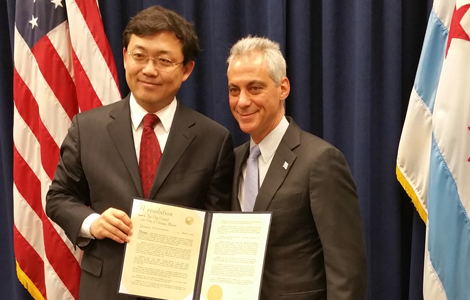Selling in China: Get in soon, early
Updated: 2015-01-31 05:50
By AMY HE in New York(China Daily USA)
|
||||||||
In 2008, after launching a new product at one of the biggest annual technology trade shows in the United States, Savio Chan got an unusual e-mail. It was from an American CEO asking for his advice.
The problem: How could the CEO get his product sold in China?
The CEO was Steve Jobs, head of Apple Inc, and the product was the Macbook Air, the thinnest laptop available on the market at the time.
Jobs had just launched the Macbook Air about half a year after unveiling the first-ever iPhone. He had been asked by a reporter after the Macbook Air launch how the iPhone was selling in China.
"At that point, the iPhone was not selling in China," Chan, president and CEO of US-China Partners, a New York-based consulting firm recalled. "Jobs was trying to do a deal with China Mobile, the No 1 mobile phone carrier in China and he was going nowhere."
Jobs was frustrated with his team, came across Chan, and in his e-mail wanted to know how he complete a deal with a Chinese mobile carrier and sell the iPhone legally in the country. Though not available officially, iPhones were being used by Chinese customers, who brought them into the country from the US and then unlocked the phones, which means removing network and regional restrictions that may have come with the devices.
Jobs complained to Chan, saying that Apple was one of the largest tech companies in the US and that China Unicom — a state-owned telecommunications company and the world's third-largest mobile provider — was a "small company," Chan said on Jan 30 in an interview in New York, where he was to promote his latest book, China's Super Consumers: What 1 Billion Customers Want and How to Sell It to Them.
"China Unicom is not small. At that time, it had 150 million subscribers. AT&T and Verizon are not much bigger, frankly. So get into China now, and you'll be very, very happy. You'll make a gazillion dollars. And before you know it, China will be the No 1 market for you," Chan said.
His advice for Jobs? "In China, you must get in soon, get in early with the right partner." The key to any company's strategy for broaching the Chinese market is to enter as soon as possible and collaborate with the best local ventures.
"iPhone was number six last year in China. They're not even No 1. It was number six behind all the other players, Samsung, Lenovo, and others. Last quarter, they were number four, when they rolled out with the iPhone 6 and iPhone 6 Plus," Chan said. "With China, you don't have to be No 1 in terms of market lead space. You can be number six and still make more money than a lot of people."
On Jan 27, Apple CEO Tim Cook, who succeeded Jobs in 2011 after he died following a long battle with pancreatic cancer, reported the company's biggest quarter ever. Apple reported $16.1 billion in revenue in greater China for the most recent quarter, which is up 70 percent from the same period a year prior, boosting its overall profit to $18 billion and shattering analyst predictions on number of iPhone units moved. It sold 74.5 million phones, 12 million more than predicted.
China's super consumers — as Chan and co-author Michael Zakkour call China's new middle class in their book — are no longer content with products that are just "Made in China" but not sold and easily accessible to those in China, Chan said. They want to have the ability to purchase foreign goods, too, and Western companies often don't fully understand Chinese customers.
"There is so much misinformation and misunderstanding about China," Chan said. "I give lectures and keynote speeches at schools and institutions, and people have a lot of curiosity, but they know so little."
Companies don't understand that the Chinese are not merely carbon copies of Western consumers, with the same wants and tastes, and are not driven to make purchases by the same desires, he said. There is also a tendency to view China as solely a country that manufacturers, and not one filled with people who have evolved: "The Chinese don't want to make iPhones anymore, they want to own iPhones," Chan said. "This is a $10 trillion economy that's growing at 7 percent a year. Shopping is like a sport now."
Companies also make the mistake of bringing in American-type negotiating tactics, "bringing in contract after contract, teams of lawyers, and non-disclosure agreements," Chan said, "but the Chinese don't operate that way. We're a people of pride and we need to learn more about people's characters before we can work."
Firms that don't fully understand China tend to assume that they can go it alone in China, without partnering with local ventures, and that's a mistake, he said. "Uber is a good example of this. They think they can go at it alone, but they're going to run into troubles, and we're already seeing the kinds of problems they're facing," Chan said.
amyhe@chinadailyusa.com
Most Viewed
Editor's Picks

|

|

|

|

|

|
Today's Top News
Top-level lab gears up to study Ebola virus
Jan manufacturing PMI falls to 28-month low
Central China city allows 72-hour visa exemptions
Beijing to build Universal Studios
Head of China Minsheng Bank resigns
78% of China's luxury spending done overseas
Mexico suspends high-speed train project
Alibaba may face class-action suit
US Weekly

|

|
















